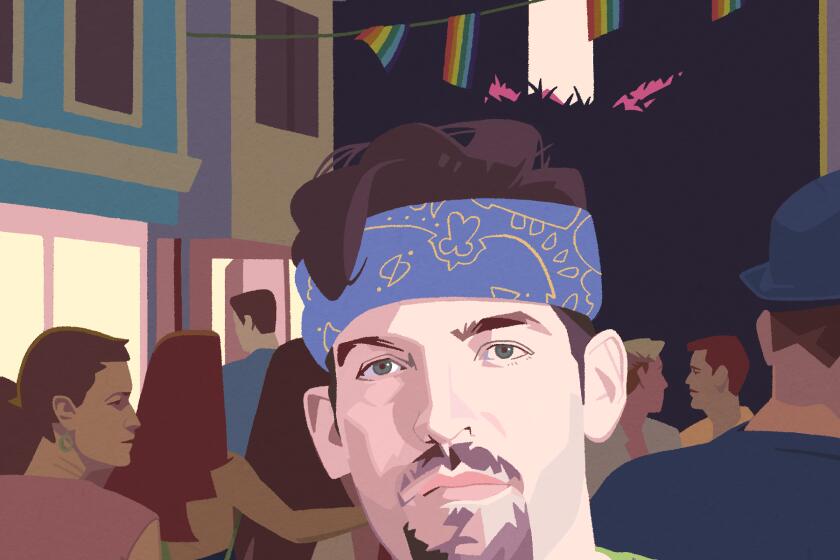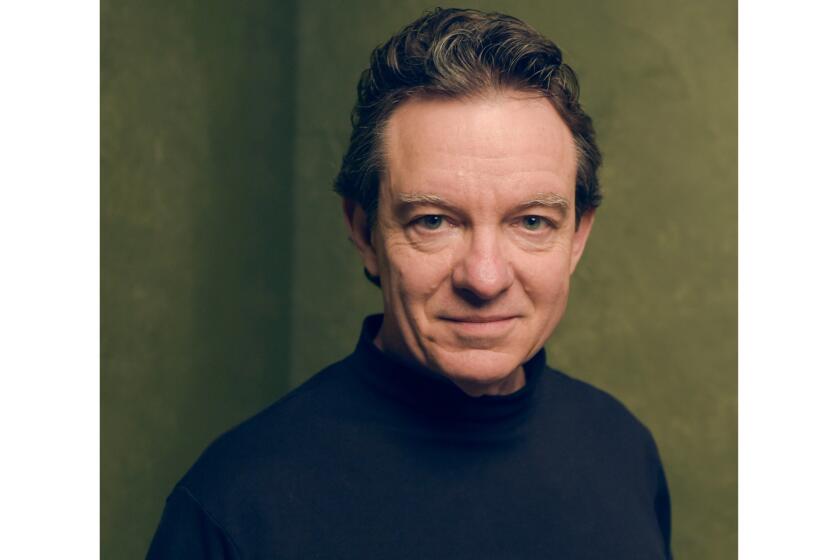How Bryan Washington reinvented Houston and the marriage plot
- Share via
On the Shelf
Memorial
By Bryan Washington
Riverhead: 320 pages, $27
If you buy books linked on our site, The Times may earn a commission from Bookshop.org, whose fees support independent bookstores.
Bryan Washington is walking his dog near his home in Houston when he answers the phone.
“She’s a Shiba Inu,” he says. “Her name is Saki, and she’s 8 months old.” There’s a hint of pride in his voice, but not of ownership — more a sense of the joy of caring for another creature.
The comforts of domesticity are a good place to start a conversation with Washington — first because “writing and my boyfriend and walking the dog” are the things that ground him as the wave of attention crests for his first novel, “Memorial.” And second, “Memorial” itself is a turn toward more intimate, normative material in the wake of “Lot,” his 2019 debut collection of stories.
“Lot,” which made many best-of-year lists (including Barack Obama’s), focused almost entirely on underrepresented characters from Houston’s margins: poor, queer, disenfranchised, neurodiverse. “Memorial” zeroes in on a couple, Benson and Mike, whose relationship is on shaky ground. Benson is a Black day care teacher, Mike a Japanese American chef. Mike’s mother, Mitsuko, arrives unexpectedly with news that his father, Eiji, is dying of cancer in Osaka, where he is the proprietor of a bar.
Washington may one day be known as Houston’s bard, but as you might guess from his new novel and his dog, he also has a thing for Japan, which he first visited in 2015. “I had a friend who moved back to Japan, who told me I had a place to stay whenever I liked,” he says. “I discovered that if I didn’t mind a 48-hour layover, plane tickets were pretty cheap.”
Former U.S. Poet Laureate Natasha Trethewey always wrote of public pain and private struggle. Her memoir, “Memorial Drive,” lets her mother speak.
He was most taken with Osaka, the country’s second largest (and still massive) city. “The people there were just so warm and welcoming,” Washington says. “It’s rare for folks to give you their time, let alone treat you with compassion just for the sake of it, and I’ve been privy to a lot of warmth in the time I’ve spent in Osaka. The closest place I know to compare it to is New Orleans.” What links them, he says, is “acceptance and generosity and community. In the novel, I wanted to try and capture some of that.”
Osaka features prominently in “Memorial,” but that’s not the only thing that distinguishes its settings from those in the stories. The Houston in the novel is also a warmer place. It remains, as in “Lot,” an incredible hotbed of diversity. But here it’s the backdrop for a book more intensely focused on the bonds of family — whether forged by blood or the kinds of affinities that thrive in big cities.
“It’d be intellectually dishonest, and boring as hell, to write a monocultural narrative set in Houston,” Washington says. “It’s a gift to live in a city with so many communities coming together and challenging one another and expanding our ideas of what a city can be.”
Take, for example, Houston’s food scene, a particular inspiration for the author. Washington has written essays about cooking and reads cookbooks (sorry) voraciously, especially in this year of lockdowns. “Right now, I’m just making lots of soft, sweet things,” he says. “Scones, puddings, things like that. Things I can drop off and share with friends.” What’s his favorite scone flavor? “Banana nut! You can’t go wrong.”
Food plays a complex role in Washington’s narratives — comforting one moment and fraught the next. In one of the short stories in “Lot,” a boy eats an egg sandwich before doing something incalculably cruel to his aunt. In another, marinating meat becomes a family rite. In “Memorial,” Mitsuko’s meal preparation sets the tone for her initially awkward interactions with Benson, her son’s boyfriend — and a budding relationship in which the currency is not desire, but care.
“Mitsuko’s the one character in the novel who’s constantly looking to comfort the folks around her — who is at all times conscious of what needs to be said and how it needs to be said,” Washington says. “In a lot of ways, she is the book’s foundation.”
Paul Lisicky’s memoir “Later” encapsulates a quarter-century of queer life
Although the ad hoc family in “Memorial” is perhaps more upwardly mobile than the characters in “Lot,” this is still no run-of-the-mill American domestic drama. “I wanted to write a novel with very few white characters, but also a novel with as little of the white gaze, if you will, as possible.” Not a shred of the tired old capitalist “marriage plot” can be found here; Washington lingers instead on characters like Eiji’s doctor, who seems to love his patient as surely as a spouse would.
“Memorial” is, simply, a novel in which a queer couple of color is centered in every way. “Their queerness and their intimacy and their loves and hopes and fears are, ideally, existing simultaneously,” Washington says. “They all matter, and they’re all a part of what makes them who they are. I wanted to write a book where each facet of their just being a person was seen as valid and given the space to expand, without trafficking in their trauma.”
Which isn’t to say he had any particular audience in mind. Washington says he wrote this book “without a contract. I had a lot of support from friends, both writers and non-writers, but I did not know that there was a market for it while I was working on it. That’s really important to me. I had no idea if anyone would understand what I was trying to do, and I wasn’t trying to meet anyone’s expectations except my own.”
One of the expectations Washington set for himself was to make sure Benson and Mike’s sections were in balance. While Ben and Mitsuko fashion a day-to-day life as roommates, Mike gets to know his father’s small but important support network.
It feels like the next step in queer coming-of-age, not just for Washington’s fiction but for society: a recognition of the roles queer adults play in their own parents’ evolution. “The room Ben and Mike give their parents to grow in their respective trajectories of acceptance, even if it takes everyone involved a minute to get there, is a lesson in itself,” Washington says. “Each of them is searching for community, even if they don’t see it as such, and the act of searching and continuing to seek it out is growth in itself. There really isn’t an end point. The continual recognition and seeking is the goal.”
And yet, there is always an end point for a book. Now that “Memorial” is out, what comes next? “A break, hopefully,” he says. But, of course, there is the TV adaptation, recently announced by A24, which Washington will write. “The team I’m working with is super lovely. We’re all just trying to make something really cool.”
Patrick is a freelance critic who tweets @TheBookMaven.
More to Read
Sign up for our Book Club newsletter
Get the latest news, events and more from the Los Angeles Times Book Club, and help us get L.A. reading and talking.
You may occasionally receive promotional content from the Los Angeles Times.









